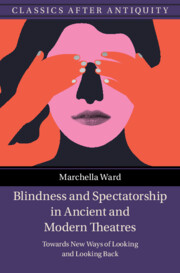 Blindness and Spectatorship in Ancient and Modern Theatres
Blindness and Spectatorship in Ancient and Modern Theatres Book contents
- Blindness and Spectatorship in Ancient and Modern Theatres
- Classics after Antiquity
- Blindness and Spectatorship in Ancient and Modern Theatres
- Copyright page
- Dedication
- Contents
- Figures
- Acknowledgements (Situating Knowledges)
- Notes on the Text
- Introduction: Looking and Looking Back
- Chapter 1 Towards Visual Activism
- Chapter 2 Blindness and / as Punishment
- Chapter 3 Blindness as Metaphorical Death
- Chapter 4 Blindness as Second Sight
- Interlude: Colonial Visions
- Chapter 5 Blindness and Spectatorship
- Conclusion: Assembling the Future
- Bibliography
- Index
Conclusion: Assembling the Future
Published online by Cambridge University Press: 30 November 2023
- Blindness and Spectatorship in Ancient and Modern Theatres
- Classics after Antiquity
- Blindness and Spectatorship in Ancient and Modern Theatres
- Copyright page
- Dedication
- Contents
- Figures
- Acknowledgements (Situating Knowledges)
- Notes on the Text
- Introduction: Looking and Looking Back
- Chapter 1 Towards Visual Activism
- Chapter 2 Blindness and / as Punishment
- Chapter 3 Blindness as Metaphorical Death
- Chapter 4 Blindness as Second Sight
- Interlude: Colonial Visions
- Chapter 5 Blindness and Spectatorship
- Conclusion: Assembling the Future
- Bibliography
- Index
Summary
In the Conclusion to this book, we move from looking back to assembling a future. This chapter shows that the metaphorical uses of disability that have been examined throughout the book remain with us in the present. And it attempts to set out some approaches towards ending this practice of making meaning out of bodies. This will require, the conclusion argues, more than a commitment to neoliberal diversity initiatives and to inclusion (though inclusion remains nonetheless urgent) – it will require us to decolonise the way that we look, and to disassemble the classical tradition in favour of models that insist on the receiver’s accountability. Maria Oshodi’s 1992 play Hound is an important text in this chapter, which looks beyond the line, or inheritance model of classical reception to the example of Stacey Park Milbern’s ‘crip ancestorship’ model. Ultimately, the conclusion is invested in the core questions of this book: what kind of an ancient world would we need to imagine, who would we need to take as our ancestors, and how might we organise the models that figure our relationship with it and them, in order for a more equal future to become our reality?
Keywords
- Type
- Chapter
- Information
- Blindness and Spectatorship in Ancient and Modern TheatresTowards New Ways of Looking and Looking Back, pp. 234 - 251Publisher: Cambridge University PressPrint publication year: 2023


